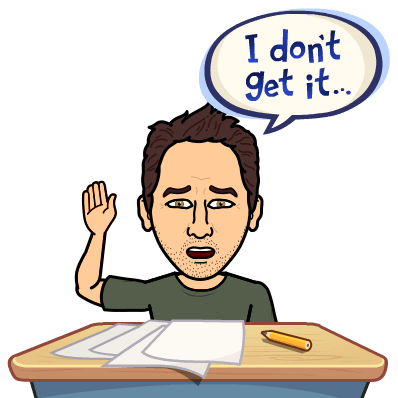Over the past 6 months I’ve been living way down south in sunny Lima, Peru. Why am I here? Well it’s pretty simple, I got lucky enough to marry an amazingly talented woman who plays volleyball professionally down here, that’s why.
Now, for those of you who don’t know, Spanish is the dominant language here. Prior to moving to Peru my range in Spanish vocabulary was limited. I took a couple classes back in university and brushed up on my phrases before I flew down, but that’s about it.
It’s gotten to the point that I can effectively make my way around the busy city. I know how to politely interact with a cab driver and barter so they don’t give me the gringo price, and I can work my way through the grocery store checkout without much trouble.
But if you throw me into a random conversation with a Peruvian asking me a question that I’m not ready for, I freeze.
My brain races for the words I know and if nothing immediately comes to mind I usually just say something along the lines of…
“¿Que?” – if I’m feeling hopeful that a second round might help.
“Si” – if I have no clue but just want to seem polite.
Or “Yo no hablo mucho español” – if I feel like they want an answer, but I just want them to leave me alone.
Or if I’m lucky I look to my wife who speaks the language much better than I do.
One bad habit that I have noticed creeping in is that pretty much anytime I don’t feel like I’m in control of the conversation I just assume I don’t know and duck out. And lately I’ve really been trying to overcome this mindset. I’ve realized when listening to conversations that I can pick up and understand more than I initially assume.
The greatest challenge that I’m finding when sticking to my guns and trying my best to understand, is that they get very confused when they ask a simple question like, “What size do you want?” and I respond by asking them to either repeat themselves or explain that I’d rather have my coffee to go.
Despite the fact that I’m 6’5 and look like I’m fresh out of the Jorge Chavez International Arrivals, many locals assume I speak fluent Spanish. And while I appreciate the benefit of the doubt, I wouldn’t mind having a little wiggle room for error.
The whole experience of trying to speak a new language in a foreign country is both intimidating and often times quite embarrassing. It’s been a serious challenge to not let myself get discouraged and keep my head held high while I’m stumbling along the way.

Nevertheless, there is still one refuge for me to learn in. And my hope is that from what I have discovered about this environment you too can find new ways to broaden your personally held limitations.
The Optimal Growth Environment
In his book Mastery, Robert Greene studies countless Masters who were all able to achieve elite level success in their chosen craft. His main findings were that they all had a specific life task, the necessary intensity, a deep desire, and of course hours and hours of practice. But something they also had in their lives were mentors. People they could learn from who have been through it and could show them the way. This factor is one of the only “shortcuts” that Greene could point to in terms of speeding up the mastery process.
In his book, Greene states:
“The mentor-protégé relationship is the most efficient and productive form of learning. The right mentors know where to focus your attention and how to challenge you. Their knowledge and experience become yours. They provide immediate and realistic feedback on your work, so you can improve more rapidly. Through an intense person-to-person interaction, you absorb a way of thinking that contains great power and can be adapted to your individual spirit.”
So, what am I getting at here? What does any of this have to do with me learning Spanish?

Let me explain.
Until recently I had been plucking away at my Spanish conversations and doing my best to not tuck my tail and run when someone asked me how my day was going.
This all changed when I got a chance to step on the volleyball court again and play with a local pro team here in Lima. The only problem I found was that only a third of the guys spoke English and the remaining players spoke even less English than I could speak Spanish.
At the beginning I relied heavily on my English-speaking teammates for translation. However, as time went by and I got more comfortable with everyone, I found myself trying my best to make small talk in Spanish with those who were willing to give it a shot.
And this is where things started to really take shape and grow. I went from barely being able to hold a two second conversation to making my way through a 45 minute drive home chatting about life back in Canada.
Was that conversation silky smooth? Hell no!
But it happened, and so did numerous other clunky fumbling conversations in the weeks that followed.
So, what was missing from my earlier convos that I discovered later with my new found teammates?
A common understanding.
When I walked up to the checkout stand or prepared to place my order at McDonalds, the other person didn’t understand that I spoke next to no Spanish. They didn’t know that I had the vocabulary of a 5-year-old niñito. As far as they were concerned, I knew and could understand just about every word that came out of their mouth.
But I didn’t.
And so, it was very challenging to have a conversation in which they were repeating themselves every other sentence or finding 6 different ways to say the same thing. They didn’t understand, or for that matter even care, that I didn’t speak the language.
On the flipside, when I walked into practice or drove home with a teammate everyone knew where I was at in my “Spanish Speaking Life”. There was a common understanding that when I speak with Derek I either need to speak slower, repeat myself, and adjust my patience level. And as a result of that common worldview, I was able to have many broken Spanish conversations and actually learn a lot about my teammates.
Are you starting to see the lesson here?
For many of us, we spend a great deal of time in our own heads. Some estimates put our daily thought count at around 50,000 to 70,000. That’s a lot!
Unfortunately, as of writing this, there currently does not exist any form of technology that can instantly connect our minds to other people. Which means we must rely on something else.
Using our words. Some people call this talking or communication.
Yet many of us are living in a world where we think everyone already knows our thoughts and understands our behaviors. But guess what? They don’t. The vast majority of the 7.7 billion people on this planet know very little about you, let alone your inner dialogue.
This is why it’s so important that you have people in your life who understand you. Each one of you has your own strengths, weaknesses, goals, and passions. But if you keep that all in your own mind, it becomes very challenging for others to help you along the way.
Whether it’s a mentor, a friend, a parent, a coach, a teammate, or a nice stranger, if they do not even partially understand what you are trying to accomplish it becomes more difficult to properly help you.
In the same way that I should not expect a random Peruvian to be able to patiently work with me on my Spanish, you should not expect others to pinpoint areas of improvement or have tolerance for your shortcomings if you’ve never expressed to them what you even want to see improved.
I mean yeah, you can force them into assuming and guessing, but it’s a lot more efficient and effective to let them know ahead of time. It pays to be on the same page.
Finding a Common Understanding
So here is the real challenge for you. If you are looking to better your life, reach your goals, and shift your identity towards the person you want to become, it’s going to require some hard work. Along the path of hard work you will encounter failure and you will encounter letting others down. And if those “others” around you do not understand what you are trying to work on, both of you are going to struggle to stay consistent.
This is why it is essential that you have that kind of a conversation with the “others” in your life. Again, whether that’s a teammate, a coach, a parent, or a mentor – you need someone in your corner that understands. You need someone to hold you accountable when you struggle and celebrates with you when you overcome a personal challenge.
Without that connection to those around you, I hate to say it, but you are going to be no better off than me fumbling words and sheepishly running from discomfort as I did when it came to learning Spanish in the real world.
At the end of the day, you are not self-made.
You need people who have a common understanding about you and you should not expect yourself to get anywhere quickly without them.
You need mutually assured growth.
-Derek
P.S.
- Are you interested in shifting your identity towards growth?
- Did this article make you realize that you need some of your own mutually assured growth?
- Are you ready for some accountability towards your goals?
If you’re interested in moving forward, but need guidance and someone to mentor you along the way, I also offer 1-on-1 and group coaching for athletes. Send me an email or shoot me a message on social media to talk about what the would look like. Your first session is completely free.






